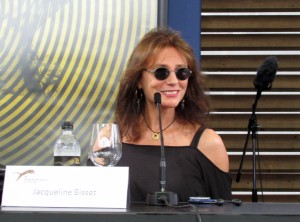by Susan Kouguell
You’ve heard the rumors. And I’m here to tell you that these rumors are indeed true.
Yes, the way to win over a film executive is with an attention-grabbing first ten pages. Of course the rest of your screenplay must continue to be as well-crafted and enticing as your first ten pages, but if your reader is not at the edge of his or her seat, wanting to find out what happens next, there is no chance that film industry folks will turn to page eleven.
 And here’s why
And here’s why
Film industry folks are smart. And busy! They have no time to waste. And frankly, why should you waste their time? And yours?
Your script is your calling card. And your script has your name on it. Be proud of the work you have done and put your best words forward. These ten pages are critical in making a lasting impression on the reader.
Film industry folks can glean in a screenplay’s opening pages whether you, the screenwriter is competent, has an understanding of the screenwriting craft, knows how to tell an interesting story with compelling characters and dazzling dialogue, and whether your script and/or you, is a match for their company.
Your script must be engaging beyond the words FADE IN on page one.
Studio and production company executives, producers, directors, story analysts, story editors, agents, managers and script competition judges, are tireless readers. They eagerly plow through their piles of screenplays to discover the next great talent (you) and your screenplay. But what are they demanding in return? They want to be transported to a world that you have created and envision it on the screen. So, how are you going to transport them? Anticipate what goes through their mind as they read the cover page and turn to page one.
These are just some of the thoughts going through the minds of movie executives when they get handed your script: Why should I care about this screenplay? How am I going to sell this? I hate this script already; it’s longer than 120 pages. Is it time to do lunch yet?
Avoid unnecessary obstacles by understanding what these film industry folks are seeking in scripts, and more specifically, in the first ten pages.
Heed the following common complaints I’ve heard from my colleagues over the years:
- There’s nothing exceptional about this script that sets it apart from other projects I’ve read.
- The plot is derivative.
- The opening pages are reading like a novel and not like a screenplay.
- The genre is confusing; it could be a horror, a comedy, a thriller, a drama. I don’t get it.
- I had no idea who the main character was or where the story was going, and after a few pages I no longer cared.
- The characters are not identifiable or empathetic.
- The characters are interchangeable.
- There are many sloppy mistakes throughout the first few pages, not only typos and formatting errors, but the writer mixed up some of the characters’ names.
- I didn’t know if the story was set in present day or in the future.
- All the characters’ dialogue sounded the same.
- The scene headings are unclear.
- The action paragraphs are too dense and are describing what the characters are thinking.
- The antagonists are not multi-dimensional.
- The pacing is slow.
- There is no sense of visual storytelling.
- This writer definitely submitted this project before it was ready to be seen. It’s rushed, confusing, and sloppy.
Your script is one of many — maybe tens, or even hundreds of screenplays — that will arrive on movie company desks and email inboxes weekly, if not daily. To get your script read and even considered for production or representation is tough — and that’s an understatement.
Top Tips to Make Executives Love Your Script
- Demonstrate that you understand what your story is about (and that you haven’t thrown in the kitchen sink filled with many ideas that don’t add up to one interesting plot) and convey it with clarity and imagination.
- Write a gripping plot that despite the genre will be plausible and engaging.
- Create characters with whom a reader can empathize. (Empathy does not mean sympathy; it means that the reader must care what happens to your characters, whether your character is the hero or the villain.)
- Dazzle them with great dialogue. The words that flow from your characters’ mouths must ring true; they must sound distinct and believable.
- Write action paragraphs that are concise and are as interesting a read as your dialogue.
- Give careful attention to clear visual storytelling.
- Make it a page-turner without sacrificing your story.
- Attention to good pacing and a solid structure are essential to a successful script.
- Clear and consistent genre. Readers don’t want to spend time guessing whether your intention was a comedy or drama.
- Incorrect industry standard formatting and typos shows you are an amateur and are not respecting the reader’s time with these types of sloppy errors.
Making an executive love your script is all about first impressions and lasting impressions. Give your screenplay the attention it deserves. And never forget the rumors.
Read more:
Top Tips to Tantalize an Executive to Love the First Ten Pages of a Screenplay









